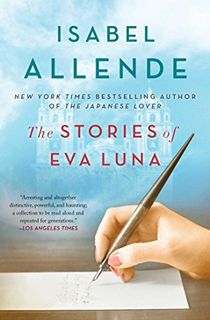It’s a singular sort of writer who can claim prominence in not only their native culture’s humanities, but also in their own specialized genre of choice. Chilean American author Isabel Allende, born in 1942, is such a writer.
A titan of Chilean literature? Check. An undisputed master of “magical realism”? Also check. Her family background is equally fascinating. She has the distinction of being a cousin of Salvador Allende, the twenty-eighth president of Chile, though nowadays she is so famous that it makes more sense for Salvador to proudly claim being related to her. At the moment, Allende has published twenty-two successful works of fiction and five works of nonfiction. And she’s still going.
Allende’s literary prowess was not always properly appreciated, though. Once upon a time, her career was translating cheesy (and now very much outdated) romance novels from English to Spanish, but she was fired from this position for rewriting the female characters into more clever, sensible, and ambitious people than they were in the original text.
When the time came to write her own books, all of Allende’s storylines and dialogues were her own, and she was free to make her women as intelligent, as strange, as spiritual, and as world-changing as she pleased. The only question now, for new readers, is which of her books to start with.
Here are four recommended novels by Allende, straight from an enthusiastic reader of all her work, that feature such women with the strong personalities her former employers abhorred, but her current readers can admire.

The House of the Spirits
“At times I feel as if I had lived all this before and that I have already written these very words, but I know it was not I: it was another woman, who kept her notebooks so that one day I could use them. I write, she wrote, that memory is fragile and the space of a single life is brief, passing so quickly that we never get a chance to see the relationship between events; we cannot gauge the consequences of our acts, and we believe in the fiction of past, present, and future, but it may also be true that everything happens simultaneously.”
This was the book that launched Allende’s career and helped popularize South American magical realism, a genre of writing that weaves magical elements into recognizable settings, in the international literary mainstream. It was originally written as Allende’s tender letter to her 100-year-old grandfather, whom she cherished as the patriarch of her family. The book evolved into a fully developed manuscript that follows three generations of the Trueba family. Their marriages, their affairs, their friendships, their dealings with the ghosts that haunt them, and their ventures into the dangerous world of early twentieth century Chilean politics string together an epic saga. One that will make every reader question, are money and power enough to make a family strong and secure?
The book begins with the circumstances that bring together two central characters, Clara de Valle and Esteban Trueba. Clara is a good-hearted clairvoyant from a wealthy family of eccentrics who exists in an entirely different dimension than everyone else. Esteban is an ill-tempered, ruthless, but determined landowner who wills success out of a seemingly cursed inheritance and overwhelming social disadvantages. His violent, cruel impulses contrast the steely ambition that builds a future for his clan.
Chile, as a country, is changing on every level, and while Clara is hardly affected, happy and content in her house of spirits, Esteban fights with all his might against progress, even at the expense of his ever-growing family. The consequences of his actions, like the series of tragedies spread out across the novel, are unavoidable. The House of the Spirits alone stands as a tribute to the power of perseverance from a writer’s perspective. It was rejected by numerous Spanish-language publishing houses before finally being snatched up by Plaza & Janés. They made exactly the right choice. The book is still a renowned bestseller and considered Isabel Allende’s outstanding masterpiece. It’s even considered the equal to Gabriel García Márquez’s One Hundred Years of Solitude.

Eva Luna
“My name is Eva, which means 'life,' according to a book of names my mother consulted. I was born in the back room of a shadowy house, and grew up amidst ancient furniture, books in Latin, and human mummies, but none of those things made me melancholy, because I came into the world with a breath of the jungle in my memory.”
Eva Luna is born a storyteller, and good stories seem to find their way to her without her even having to try. She’s born straight into the household of a half-mad professor who specializes in human taxidermy, and from there the selection of people she encounters only gets more bizarre and more mesmerizing for her incredible imagination. As a child she’s passed from home to home as a live-in servant, and she encounters a woman whose prize possession is her own coffin, a smooth-talking child criminal with street smarts and connections, a brothel owner with an open mind towards sexuality and spiritualism, a shopkeeper who seems to singlehandedly run a small town while his wife sleeps all day and is unfaithful to him, and finally, Mimi, the beautiful transgender actress who becomes her best friend.
Eva Luna’s life story unravels beside that of Rolf Carlé, a filmmaker who escapes from an abusive household and who is dedicating his life to exposing corruption through his art. They’re both storytellers, and Allende’s own role as a storyteller is to eventually unite them in a shared purpose. Eva Luna, as she blossoms into womanhood, absorbs everyone and everything she meets in preparation for her greater destiny: to become one of the most celebrated writers in Latin America. Readers journeying alongside her will root for her to achieve this dream.

The Stories of Eva Luna
“The names of persons and living creatures demand respect, because when we speak to them we touch their heart and become a part of their life force.”
Eva Luna returns in a semi-sequel and has become such a confident and worldly storyteller that she can step in the role of Scheherazade—the narrator of One Thousand and One Nights who wooed a sultan and changed her destiny through her narrative talents alone—and provide her own curious lover with a night’s entertainment through her dazzling tales. They’re alone, and she’s brimming with stories. He listens.
In this romantic and affecting collection of short stories, Eva Luna introduces her beloved paramour, and her readers, to a glorious cast of characters, such as a traveling scribe who sells words for a living, a prostitute who sells the illusion of true love, a criminal doomed by his own predetermined destiny, a woman who leaves her husband behind for a new life in a mysterious disappearing palace, and an entire village that bands together to enact long overdue justice, among others. The collection is also famous for the controversial story “Wicked Girl,” featuring an adolescent youth who falls passionately and obsessively in love with her mother’s lover, an exploration of the sheer torture which is an unrequited infatuation.
Prepare to be captivated by Eva Luna’s spell until the end of the final story, where she finally releases you from the colorful world of her imagination to seek adventure in your own. This writer suggests that you read Eva Luna before The Stories of Eva Luna. Meet and get to know the storyteller first, and then enjoy her stories.

Ines of My Soul: A Novel
“Courage is a virtue appreciated in a male but considered a defect in our gender. Bold women are a threat to a world that is badly out of balance, in favor of men.”
Finally, it’s time to time-travel, all the way back to the sixteenth century in these fictionalized memoirs of the controversial real-life figure Inés Suárez. Suárez was the devoted mistress of Pedro Gutiérrez de Valdivia, the conquistador who took over Chile in the name of the Spanish-Hapsburg Empire that ruled much of Europe at the time. Suárez, strongminded and resourceful, is his most trusted and reliable partner in this quest, and by his side she battles the Indigenous Mapuche for control over the land.
In an age where the history of colonization is being universally reviewed more closely, this novel stands as a noteworthy study of the social, political, and religious circumstances that allowed entire populations of conquerors to move into foreign territories and claim them as their own. Allende’s first-person point of view presents a speculative psychological study into the mind of a bold Spanish-born woman who, while participating in these historical events on the side of the colonizers, truly believed through her home country and her era’s vindication that she was the heroine of her own story.



